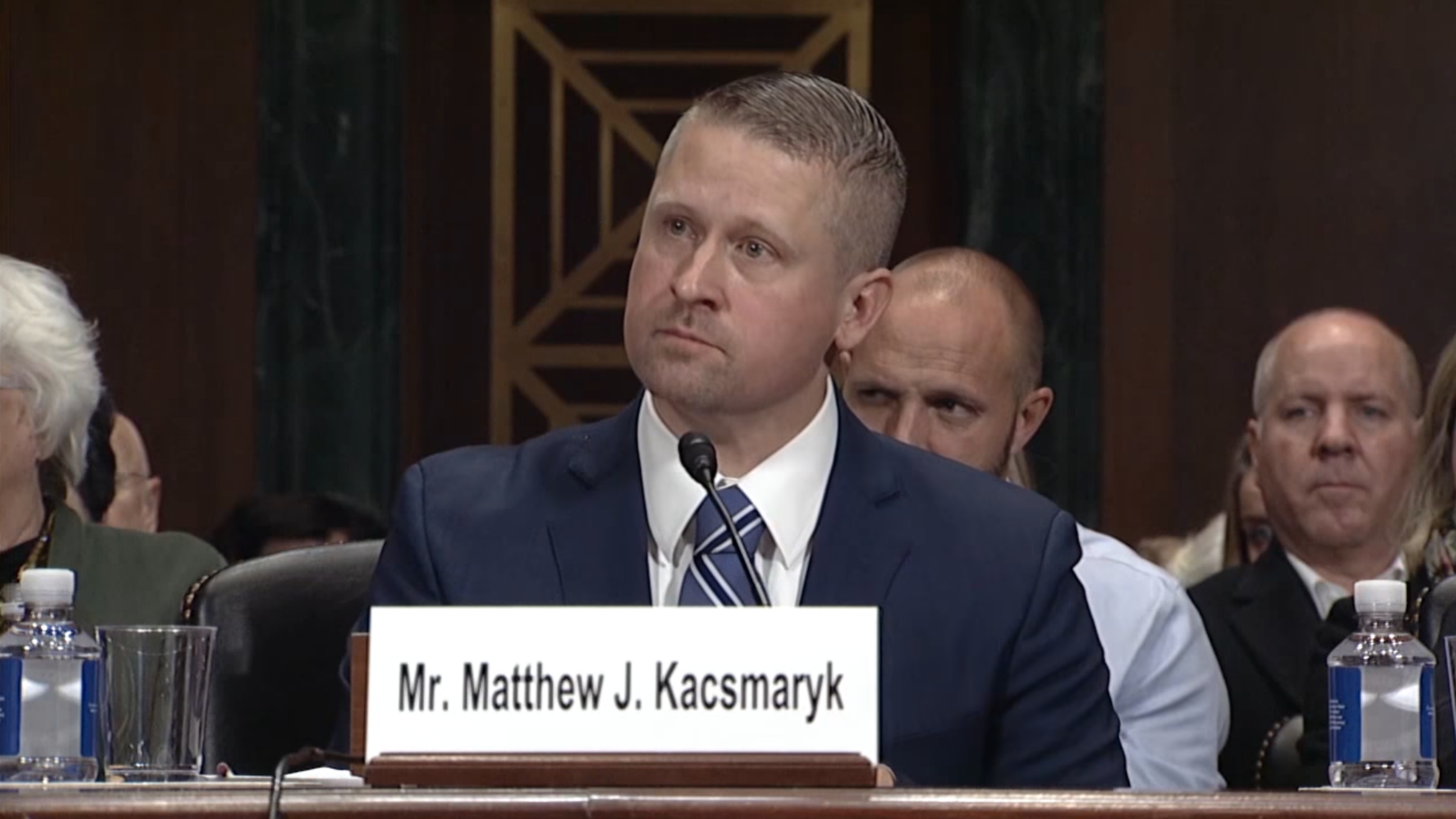Welcome to the FedSoc Twelve, a Balls & Strikes series about some of Donald Trump’s most unhinged judicial appointees. These judges, whether in their legal opinions or their off-the-clock conduct, have continued to push Trump’s agenda from the bench, forming something of a life-tenured Originalism Caucus within the federal judiciary. This summer, we’ll be checking in on these men and women now that they’ve gotten a chance to spread their wings during the Biden administration—and as they fight to be first in line for a Supreme promotion the next time Republicans control the White House.
The Résumé
Matt Kacsmaryk grew up in Texas, went to Abilene Christian University, and graduated from the University of Texas School of Law, where he helped edit the ultraconservative Texas Review of Law and Politics. (For readers feeling déjà vu, yes, previous entry Brantley Starr had the exact same résumé.) After a decade split between private practice and federal prosecutor’s offices, he became the deputy general counsel at First Liberty Institute, one of a million interchangeable right-wing advocacy groups that work to make Christian homeschooling mandatory.
First Liberty started flexing its muscle during Kacsmaryk’s tenure: The group filed several cases that eventually went to the Supreme Court, including Kennedy v. Bremerton School District, the fake case upholding a high school football coach’s right to “private, personal” prayer after he was suspended for very not-private, not-personal prayer. After the coach won before the Supreme Court, it became clear that the coach, Joe Kennedy, had lied about wanting to go back to his old job when he returned to the school, coached one game, and then quit. Did his attorneys at First Liberty know that when litigating his case? Who’s to say—by then, Kacsmaryk was already a federal judge.
Trump had a difficult time getting Kacsmaryk into his seat, and had to nominate him three separate times before Kacsmaryk was finally confirmed in June 2019. Senate Democrats successfully threw sand in the gears at first, arguing that he was prejudiced against gay and trans people and would be unable to “leave his advocacy in the robing room.” After Republicans won two more Senate seats in the 2018 midterm elections, however, they were able to confirm him, 52-46.

Screencap via YouTube
The Opinions
Since then, Kacsmaryk has become the poster boy for one of the more valuable tools in the conservative legal movement’s toolbox: judge-shopping, the practice of filing in a specific court to get a specific judge. The Northern District of Texas assigns cases based on where they get filed, and Kacsmaryk is the district’s only judge who sits in Amarillo. What this means is that anyone who files a civil case in Amarillo gets Kacsmaryk 95 percent of the time. Conservative lawyers have taken full advantage of this administrative quirk, giving Kacsmaryk plenty of opportunities to grace this website already. As a federal judge, Kacsmaryk seems to view his job as shepherding (or creating!) the highest-leverage cases that the Supreme Court might use to fight a right-wing culture war. And as you might expect for a guy with Kacsmaryk’s background, there’s nothing he cares more about doing than making it more difficult for more women to exercise their right to abortion care, in Texas and beyond.
It started small. In 2020, Kacsmaryk denied a motion to dismiss a challenge to the Affordable Care Act’s mandate that insurance plans cover contraceptives. Other courts had already allowed religious objectors to opt out of this requirement, but in the case before Kacsmaryk, objectors complained that not enough insurers were selling the plans they wanted. The Fifth Circuit stepped in to overturn him, but the case was an early look at how Kacsmaryk would write any opinion that gave him the chance to earn favorable National Review coverage: Although the case wasn’t about abortion at all, he referred to abortion as “a right notable for a complete lack of historical or textual support.”
In 2022, Kacsmaryk tried to bankrupt Planned Parenthood in Texas. Texas and Louisiana had both banned the organization from participating in Medicaid, but after federal courts paused those orders, Medicaid continued to reimburse Planned Parenthood as usual. When the Fifth Circuit eventually allowed the bans to take effect, a “whistleblower” sued, claiming that Planned Parenthood had committed Medicaid fraud by submitting claims in the interim—claims that federal courts had expressly told them they could submit. Incredibly, Kacsmaryk agreed, allowing the $1.8 billion case to go forward. Both Planned Parenthood and Texas have moved for summary judgment; given how Kacsmaryk ruled the first time, it’s not hard to guess how he’ll rule on an opportunity to steal nearly $2 billion from Planned Parenthood.
In his most famous decision, Kacsmaryk tried to ban medication abortion nationwide. Earlier this year, the “Alliance for Hippocratic Medicine”—a group that appears to just be a website—challenged the federal Food and Drug Administration’s approval of mifepristone, the drug most commonly used in medication abortions. The FDA had approved mifepristone 23 years earlier, but that didn’t stop Kacsmaryk, who wrote a 100-page opinion finding that the FDA had acted illegally every time it approved mifepristone’s use in abortion since. (He also had to find that the “Alliance” is harmed by mifepristone’s authorization; to get there, he argued that mifepristone could “overwhelm the medical system” with abortion complications, despite literally decades of evidence to the contrary.) That order is now before the Supreme Court.
Not that Kacsmaryk is necessarily the Court’s biggest fan. Recently, he’s built up a side hustle trying to undermine the Court’s 2020 decision in Bostock v. Clayton County, which held that federal employment law prevents employers from discriminating against gay or trans people. Conservative commentators revolted. Kacsmaryk plotted instead. In two cases about laws that ban discrimination “on the basis of sex,” he’s refused to extend Bostock, insisting that “because of sex” and “on the basis of sex” are different phrases that justify different outcomes. Although the Court used them both in Bostock, Kacsmaryk explained that “just because a judicial opinion employs two phrases interchangeably…does not mean Congress” meant the same thing. Even when this Court gives liberals a win, in the hands of Trump judges, that win becomes “just…a judicial opinion” they are free to disregard.
The Weird Shit
After Kacsmaryk’s medication abortion decision, people began to ask how the Senate confirmed him in the first place. Researchers dug up weird interviews with Christian radio outlets criticizing no-fault divorce and found evidence that he hid a transphobic law review article he drafted. Opponents suggested that Kacsmaryk had covered up these episodes make his confirmation easier, but to be clear, everything he did disclose to the Senate was already pretty out there. See, Kacsmaryk was not just a perennial Federalist Society panelist or a regular on the conservative speaking circuit. No. This man blogged.
The publications Kacsmaryk was writing for should have tipped off every reasonable observer about where he was going to go. In 2016, he wrote a blog complaining about rules protecting access to healthcare for gay and trans people for First Things, a far-right publication that has published blogs nitpicking the literal Pope’s interpretation of a Biblical parable and podcasts that claim that “cancel culture is the modern version of the KKK or lynch mobs.” (For those wondering, First Things did not give the Pope equal time to respond.) In 2015 and 2016, Kacsmaryk wrote two blogs—one warning about a proposed law protecting gay and trans people from employment discrimination, and another referring to contraceptive medicine as “abortifacients”—for Public Discourse, the journal of a far-right think tank that helped fund a debunked study claiming that gay people are bad parents.
If Republicans had known of Kacsmaryk’s skepticism of legal divorce, they might have been leerier about making him a federal judge. But his opinions (in both the colloquial and legal senses of the word) are exactly why Trump nominated him and why Senate Republicans ultimately confirmed him: Kacsmaryk is now writing 80-page versions of the same blogs he used to crank out for fringe publications, except now with the force of law behind him. He’ll keep doing it until the Northern District of Texas assigns another judge to Amarillo or the next Republican president promotes him—whatever comes first.



